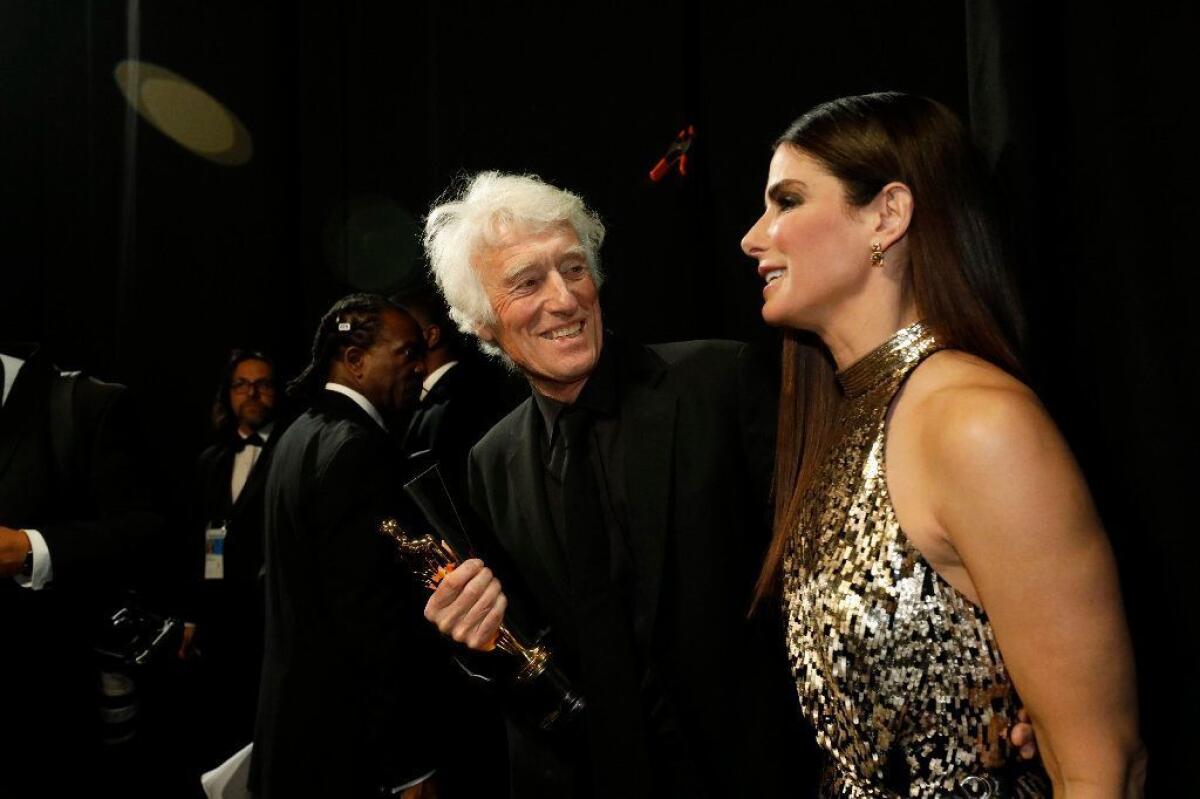Oscars reverse course: All awards will be presented during telecast

Bowing to fierce blowback from the film industry — and throwing yet another wrench into an already tumultuous Oscar season — the motion picture academy announced Friday that it is shelving a controversial plan to move the presentation of four key awards to commercial breaks during this year’s telecast.
The decision follows several days of outcry that pitted the academy’s leadership against some of the organization’s most distinguished members, as hundreds of Hollywood luminaries rallied against a proposal that, while intended to help limit the notoriously lengthy telecast to three hours, was widely regarded as representing a slight against some of filmmaking’s most vital crafts.
In an official statement, the academy’s leadership said, “The Academy has heard the feedback from its membership regarding the Oscar presentation of four awards — Cinematography, Film Editing, Live Action Short, and Makeup and Hairstyling. All Academy Awards will be presented without edits, in our traditional format. We look forward to Oscar Sunday, February 24.”
The reversal followed an emergency meeting held Thursday evening involving the academy’s chief executive, Dawn Hudson, and president, John Bailey, and a handful of prominent members of the cinematography community: American Society of Cinematographers President Kees van Oostrum and cinematographers Hoyte van Hoytema (“Dunkirk”), Emmanuel Lubezki (“The Revenant”) and Rachel Morrison (“Black Panther”).
“I didn’t know where it was going to go – it could have gone the other way,” Van Oostrum, who became the de facto leader of the campaign opposing the plan, told The Times in the wake of the decision.
“I think we made very clear that we feel that cinematographers and all the crafts need to be respected in the proper way,” he continued. “But at the same time we were also concerned because the grass-roots [campaign] went so wide and so deep with so many people that in the end we said, ‘We don’t want to hurt the academy. And the academy will be hurt by this decision if they don’t reverse it.’
“So I’m very, very glad because the academy is a great institution. It’s an extremely important organization for our city, for our people and for our filmmakers.”
First announced by the Academy of Motion Picture Arts and Sciences’ board of governors in August — with specific categories unveiled on Monday — the plan would have shifted the presentation of the awards for cinematography, editing, hairstyling and makeup and live-action short to commercial breaks. The winners’ speeches would have been edited into a later portion of the broadcast.
In future years, four to six other categories would have been rotated out of the live telecast in a similar fashion, although the four categories affected in 2019 would have been guaranteed traditional presentations in 2020.
“Viewing patterns for the Academy Awards are changing quickly in our current multimedia world, and our show must also evolve to successfully continue promoting motion pictures to a worldwide audience,” academy President John Bailey wrote in a letter to members explaining the move, even as he assured them that the group was “still honoring the achievements of all 24 awards on the Oscars.”
The flap is just the latest in a string of crises that have roiled this awards season, whipsawing academy members and longtime Oscar observers alike.
In September, the academy’s leadership scrapped a much-criticized plan to create a new “best popular film” category for this year’s Oscars just weeks after it had been announced. In December, Kevin Hart stepped down as the announced host of the show amid an uproar over past homophobic tweets and jokes, leaving the Oscars without a formal host for the first time in 30 years.
The academy’s leadership — which had selected the categories in conjunction with governors from the individual branches — expected some degree of resistance to the idea of shifting some awards out of the live telecast. But it was unprepared for the overwhelming tide of antipathy it received from boldfaced names from across the movie business.
The vocal protest became a severe public-relations crisis for an organization that considers itself the public face and ultimate champion of the film industry.
Many members found the selection of the four specific categories surprising and baffling, particularly given that Bailey is himself a cinematographer and his wife, Carol Littleton, is an editor, with both serving on the academy’s board of governors.
“How many people have seen the shorts — maybe 2,000? And that’s including academy members, by the way,” one academy member told The Times earlier this week (although an annual Oscar nominated shorts program released theatrically has grossed over $2 million domestically this year). “Keeping those on the show and throwing aside cinematography and editing doesn’t make any sense.”
Hundreds of directors, actors and other film professionals, including past Oscar winners as notable as Martin Scorsese, Robert De Niro and Meryl Streep and current nominees such as Alfonso Cuarón, Emma Stone, Spike Lee and Glenn Close, signed an open letter calling the plan “nothing less than an insult to those of us who have devoted our lives and passions to our chosen profession.”
Various guilds including the American Society of Cinematographers, International Cinematographers Guild, American Cinema Editors and the Make-Up Artists and Hair Stylists Guild (IATSE Local 706) also made public statements in opposition of the plan.
In a statement, the American Cinema Editors guild endorsed the academy’s decision to change course, thanking “the Academy for hearing and acting on the concerns of the industry and the artists who are such a vital part of the filmmaking process. We are pleased that the film editing award, along with all other categories, will be presented in its entirety. We would also like to express enormous gratitude to the many prominent filmmakers and industry leaders who stood up and spoke out for the recognition of our craft.”
The California IATSE Council, which includes guilds for makeup and hairstylists, costume designers and art directors, among others, similarly weighed in with relief. “We believe the continued recognition of the talents and artistic contributions of the cinematographer, editor, and the makeup artists and hairstylists are true to the Academy’s long history of honoring the best in filmmaking — whether that means the faces known to the public or the unknown faces of the men and women who work behind the camera but whose contribution to the film is equally valuable,” the council said in a statement.
“Everyone who works in our industry knows that the making of a film is a collaboration of many people, all of whom bring their artistic skills, craft, and love of motion pictures to the end result. We are glad that the Oscar audience will see that reality next Sunday.”
With the ratings for last year’s telecast hitting an all-time low, many within the academy’s leadership returned to the argument that trimming some awards out of the live broadcast, while painful, was necessary. But in a 91-year-old organization that proudly guards its traditions, reaching consensus on how to do that has proved next to impossible.
In 1992, for instance, the board of governors voted to remove the live-action short film and documentary short-film categories from the ceremony. High-profile academy members including Scorsese, Steven Spielberg and Robert Redford protested, and the move was reversed, never going into effect.
“The problem over the years is that the academy has — correctly, I believe — added more branches to recognize the input of the disciplines to the moviemaking process,” producer and former studio executive Bill Mechanic, who previously served on the academy’s board of governors, told The Times earlier this week. “Everyone wants recognition on the show itself, which has made it bloated for the general public.”
The reversal of the academy’s decision means the telecast will likely risk running over its self-appointed three-hour limit, something which ABC, the ceremony’s longtime network home, had strongly advocated as a means to help boost the show’s flagging ratings.
“We are committed to a three-hour show,” Bailey told The Times last September. “It’s necessary. I feel we have a responsibility to the people who watch that show in the Eastern time zone, which is a huge market, to have that show ended by 11. Nobody that I know of has protested about that.”
Ratings concerns aside, Van Oostrum said he hopes the outcome is ultimately a healthy sign for the academy.
“The academy has returned to its roots,” he said. “If you look to its mission statement, it’s exactly this. The mission statement has nothing to do with entertaining the people – it has all to do with honoring the creative arts of the people that make movies. And I’m thrilled that it’s back to that.”
Times staff writer Glenn Whipp contributed to this report.
Twitter: @joshrottenberg
More to Read
Only good movies
Get the Indie Focus newsletter, Mark Olsen's weekly guide to the world of cinema.
You may occasionally receive promotional content from the Los Angeles Times.











